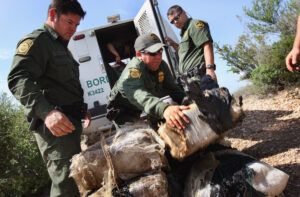WOLA Publication
April 11, 2013
WOLA is pleased to launch the publication “Marijuana Policy and Presidential Leadership: How to Avoid a Federal-State Train Wreck,” by Stuart Taylor, Jr., Brookings Institution nonresident senior fellow. This paper is one of a series WOLA is undertaking in partnership with Governance Studies at the Brookings Institution.
In this paper, Taylor examines how the federal government and the eighteen states (plus the District of Columbia) that have partially legalized medical or recreational marijuana or both since 1996 can be true to their respective laws, and can agree on how to enforce them wisely while avoiding federal-state clashes that would increase confusion and harm communities and consumers.
This paper seeks to persuade even people who think legalization is a bad idea that the best way to serve the federal interest in protecting public health and safety is not for the federal government to seek an end state legalization. To the contrary, Taylor asserts, a federal crackdown would backfire by producing an atomized, anarchic, state-legalized but unregulated marijuana market that federal drug enforcers could neither contain nor force the states to contain.
In this broad-ranging primer on the legal challenges surrounding marijuana legalization, Taylor makes the following points:
- The best way to serve the federal interest in protecting public health and safety is for the federal government to stand aside when it comes to legalization at the state-level.
- The federal government should nonetheless use its considerable leverage to ensure that state regulators protect the federal government’s interests in minimizing exports across state lines, sales outside the state-regulated system, sales of unduly large quantities, sales of adulterated products, sales to minors, organized crime involvement, and other abuses.
- Legalizing states, for their part, must provide adequate funding for their regulators as well as clear rules to show that they will be energetic in protecting federal as well as state interests. If that sort of balance is struck, a win-win can be achieved.
- The Obama Administration and legalizing states should take advantage of a provision of the federal Controlled Substances Act (CSA) to hammer out clear, contractual cooperation agreements so that state-regulated marijuana businesses will know what they can and cannot safely do.
- The time for presidential leadership on marijuana policy is now. The CSA also gives the administration ample leverage to insist that the legalizing states take care to protect the federal interests noted above.
Stuart also surveys (1) what legalizing states can and cannot do without violating federal law; (2) the Obama’s administration’s approach to medical marijuana and; (3) current marijuana law at the federal level and in Colorado and Washington State.
- Download and read the full paper
- Download Appendix 1: The Obama Administration’s Approach to Medical Marijuana: A Study in Chaos
- Download Appendix 2: Conflict of Laws: A Quick Orientation to Marijuana Law at the Federal Level and in Colorado and Washington State
Additional Resources:
- Washington Versus Washington (and Colorado): Why the States Should Lead on Marijuana Policy. March 28, 2013




